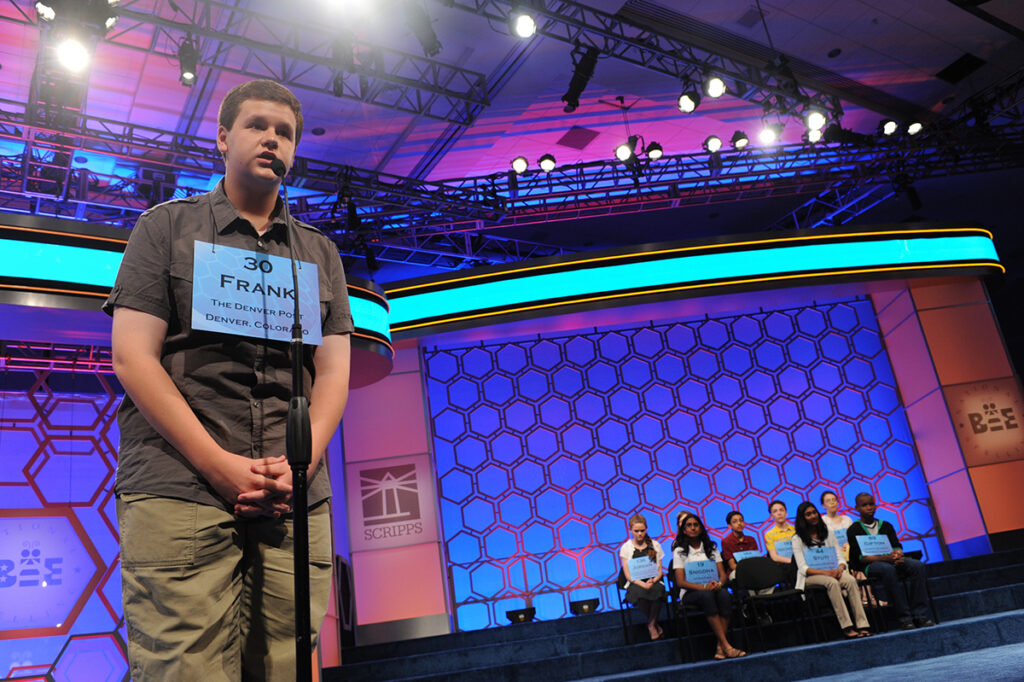The world’s top spelling bee is coming up. This Berkeley Ph.D. student built the word list.
Comparative literature student Frank Cahill competed in the Scripps National Spelling Bee as an eighth grader. This year, on May 28 and 29, he’ll be on the other side of the stage.

May 19, 2025
There’s a word UC Berkeley comparative literature Ph.D. student Frank Cahill will never forget. He misspelled it as an eighth grader in the second round of the live televised Scripps National Spelling Bee finals.
Porwigle. Yes, you read that correctly. The word was p-o-r-w-i-g-l-e, pronounced por·wi·gle.
He’d prepared for that moment in 2012 for years, competing in spelling bees across the country as a student at Ave Maria Catholic School in Parker, Colorado. He knew Japanese words, Greek words, German words. But this alteration of the Middle English term for tadpole stumped him. As most of us would, he added an extra g. (Moments before this fateful flub, he had successfully spelled “dedans,” an obscure French word for the spectators at a court-tennis match.)
“I was totally devastated,” he said.
After he missed it, he stayed composed — he was on live television at the world’s top spelling bee, after all — and sat down. When he got back to his seat, though, the waterworks started. “Just nonstop tears for days,” he said. “It was a good first lesson that, yes, hard work pays off, but some things don’t go your way, and you better learn how to manage that.”
More than a decade later, Cahill is a word panelist for the 100th Scripps National Spelling Bee. The annual competition in Washington, D.C., will include 243 youth from all 50 U.S. states and several U.S. territories, plus five countries outside of the U.S., and will be televised live on May 28 and 29.
Enchanted by words
Cahill’s mom loves to remind him that he was slow to start reading. But when he finally caught on, he was hooked.
Words enchanted him. He became fascinated with their meanings, where they came from and how they sounded. “Weissnichtwo,” a German word meaning an indefinite, unknown or imaginary place, was one of hundreds he relished. “Eisteddfod,” a competitive arts festival in Wales, and “pogonotomy,” a word of Greek origin for the cutting or shaving of a beard, were also among his favorites.
“It’s like having contact with a new culture, a new kind of world,” he said. “It’s just so intoxicating.”

In his role as a word panelist, Cahill coordinates the list of words used in the national competition. He has been working with a team for months, scouring the Merriam-Webster Unabridged Dictionary for words that he hopes will transport the competitors to new worlds, where they can draw upon their vast knowledge and love of words. Any word in the dictionary is fair game, said Cahill, but there’s no way the competitors can memorize every entry, so it’s important they develop a “holistic sense of language and how words work” in order to make informed guesses when they’re confronted by an unknown word.
Spellers from around the globe who are 15 years old and younger arrive at the end of the month in Washington, D.C., for an entire week of spelling events. First, it’s the preliminaries, which includes spelling, vocabulary and a written test. Then, the quarter-finals, semi-finals and, at long last, the finals. In celebration of its 100th anniversary, there will be a slew of special events this year, including a former champion showdown.
On May 29, the day of finals, only about a dozen competitors will remain. They’ll have their hair and makeup done, give interviews with TV reporters, and at 8 p.m. (ET), they’ll make their way to their seats on a brightly lit stage in front of a packed auditorium. Millions more will be watching on live TV.
It’s the spellers’ one shot to be the champion of the Scripps National Spelling Bee.
The big day
When Cahill thinks about being on that stage, he said his “stomach gets a little queasy.” Even though today’s spellers are “beyond prepared,” he added, it’s hard not to feel the pressure.
Sitting among the other officiants right in the front, Cahill, who has worked in other various roles at the bee over the years, knows exactly what to expect.
“They’re fully there, locked in,” he said. “It’s really just so impressive. There’s a performance aspect to it, they have to learn to manage their nerves, how to interface with the pronouncer. Giving young people the ability to do that, I think, is really important.”
The finals can include dozens of rounds, depending on the word list and whether a tiebreaker is needed. The competition continues until there is a winner, who will receive a $50,000 cash prize.
After being eliminated in 2012, Cahill has come to realize that the bee is about so much more than winning; it’s about the confidence and curiosity that it continues to give to generations of young people.
“Communicating well means being together well with other people,” he said. “And I think having that rich understanding of how words work helps impart that skill or that ethic or that set of values. I do see this as a part of a bigger project, helping give young people civic skills.”
“Competing in the bee was such a magical experience for me,” he said. “And I hope it will be for future participants for another 100 years.”